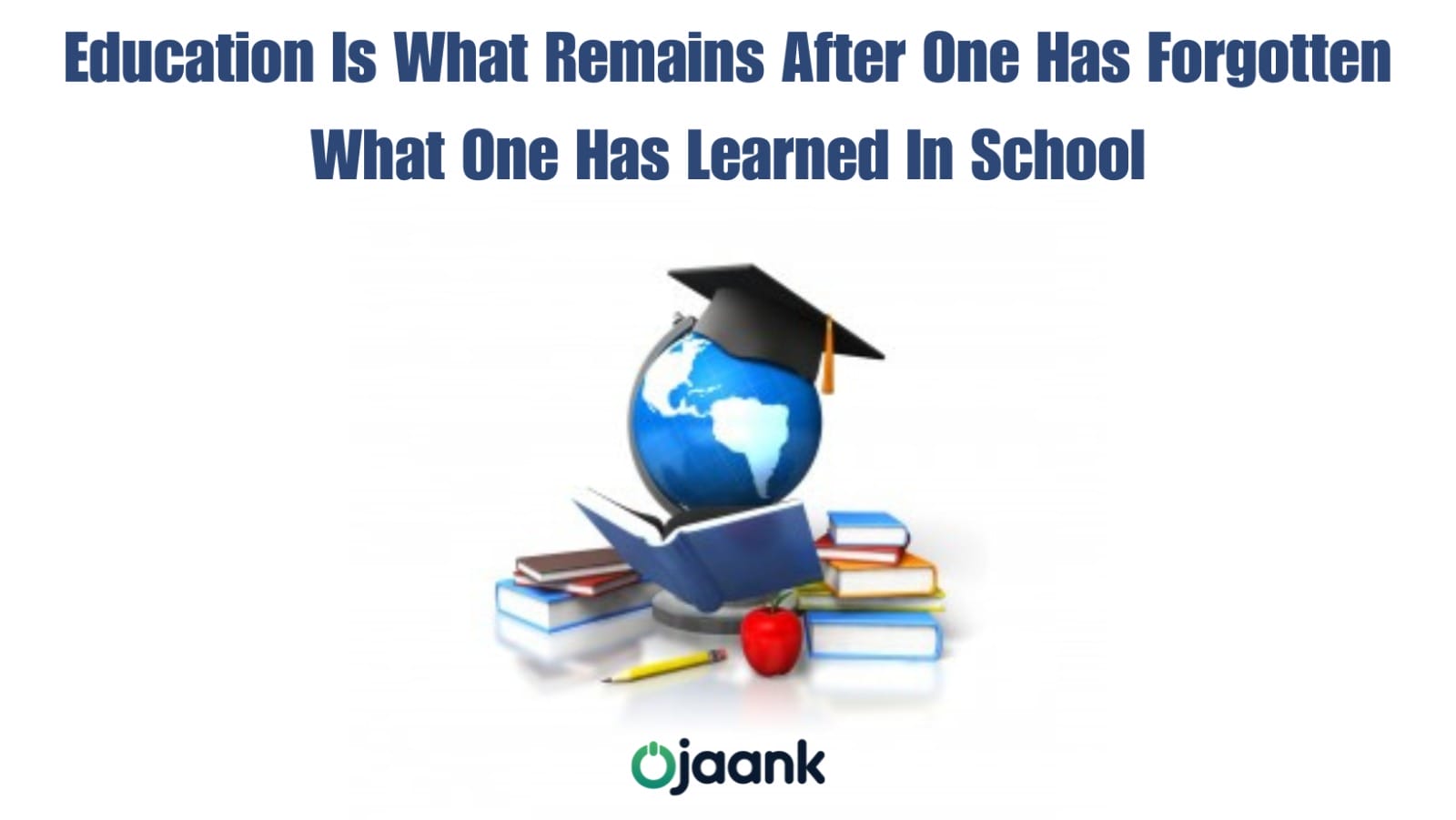Education Is What Remains After One Has Forgotten What One Has Learned In School

Albert Einstein once said, "Education is what remains after one has forgotten what one has learned in school." This profound statement challenges the conventional notion of education, prompting us to explore the true essence of learning and its enduring impact on our lives. While schools provide us with knowledge, skills, and a structured curriculum, true education transcends the classroom walls, leaving an indelible mark on our character, values, and personal growth. In this blog, we will delve into the idea that education is not limited to formal schooling but encompasses a lifelong journey of self-discovery and continuous learning.
The Schooling Experience
Schools are the primary institutions where we receive formal education. They equip us with essential skills, knowledge, and academic qualifications that are crucial for building a foundation for our future endeavors. From mathematics to literature, science to history, schools serve as the bedrock of our academic development. However, as Einstein suggests, what remains with us goes far beyond the textbooks and tests.
The Social and Emotional Learning
Beyond the subject matter, schools also play a pivotal role in our social and emotional development. It is within these halls that we learn to interact with peers, build friendships, and navigate the complex web of human relationships. The experiences we gain from school, such as teamwork, conflict resolution, and empathy, have a lasting impact on our personal and professional lives. These social skills, often learned informally, are what truly remain with us long after we leave the classroom.
Critical Thinking and Problem Solving
One of the fundamental aspects of education is the development of critical thinking and problem-solving skills. In school, we are presented with challenges and puzzles that stimulate our minds, teaching us to analyze, evaluate, and synthesize information. These skills are invaluable, extending far beyond the classroom, as they enable us to make informed decisions, solve real-world problems, and adapt to the ever-changing demands of the modern world.
The Quest for Knowledge
Education is a lifelong journey that extends far beyond our formal schooling years. The thirst for knowledge, instilled in us during our educational upbringing, propels us to seek out new information and ideas continually. We become autodidacts, constantly expanding our horizons through reading, exploring, and engaging with the world around us. This self-driven pursuit of knowledge is what remains with us, driving personal growth and intellectual fulfillment throughout our lives.
Character Building
Education is not solely about acquiring facts and figures; it is also about building character and shaping values. The moral and ethical principles instilled in us during our formative years stay with us long after we forget the specific lessons taught in school. Schools often emphasize qualities such as honesty, integrity, responsibility, and respect for others. These virtues become an integral part of our identity, guiding our actions and decisions as we navigate life's complexities.
Adaptability and Resilience
In the rapidly changing landscape of the modern world, adaptability and resilience have become essential attributes. While schools provide a structured environment for learning, life outside the classroom is unpredictable. The challenges we face, both personally and professionally, require us to adapt and bounce back from setbacks. Our experiences in school, where we encountered various difficulties and learned to persevere, contribute to our ability to navigate the ups and downs of life.
Cultivating a Growth Mindset
A growth mindset, the belief that abilities and intelligence can be developed through effort and learning, is a powerful concept that extends well beyond the confines of formal education. Schools play a significant role in nurturing this mindset by encouraging students to embrace challenges and view failures as opportunities for growth. This mindset becomes a lifelong asset, empowering us to tackle new challenges, acquire new skills, and achieve our goals.
Empathy and Global Awareness
As the world becomes increasingly interconnected, global awareness and empathy for diverse cultures and perspectives are vital qualities. Education, especially in a diverse school environment, exposes us to different cultures, ideas, and experiences. It fosters empathy and a broader understanding of the world, encouraging us to become responsible global citizens who contribute positively to society.
Albert Einstein's assertion that "Education is what remains after one has forgotten what one has learned in school" invites us to contemplate the enduring impact of our educational journey. While schools provide us with knowledge, skills, and academic qualifications, true education encompasses much more. It includes the social and emotional skills we develop, the critical thinking and problem-solving abilities we hone, and the lifelong pursuit of knowledge that defines our intellectual curiosity.
Education is not confined to the classroom; it is a lifelong journey of self-discovery, personal growth, and continuous learning. It shapes our character, values, and resilience, equipping us to face the challenges of the ever-changing world. So, as we navigate the complexities of life, let us remember that education is not merely what we learn in school but what remains with us as we strive to become better versions of ourselves.